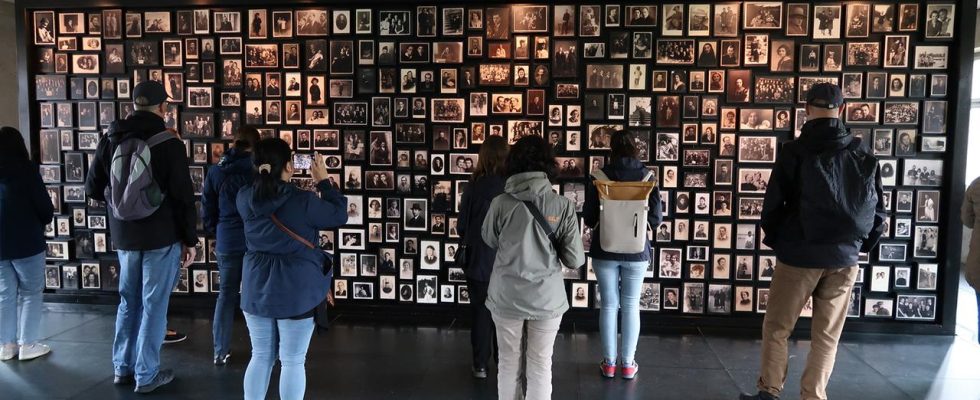The war in the Middle East is making it difficult for many people to have compassion for the other side. The “begegnen” association from Bielefeld has been trying for a long time to bring Jews, Muslims and Christians together.
If you want to shape the future sustainably, you have to understand the past and positively influence the present. That is the main idea of “begegnen” from Bielefeld. The association wants to give people of Islamic, Jewish and Christian faith the opportunity to approach each other and learn together about the history of Europe.
“We want to give people experiences that will help them stand up against anti-Semitism, anti-Muslim racism and every form of xenophobia,” says managing director Katharina Arditi.
It all started in 2018 with a trip by young Muslim people, mostly refugees, and young adults from the Jewish communities to the Auschwitz-Birkenau memorial. “The core idea was to counter the accusation that refugees from predominantly Muslim countries were importing anti-Semitism into Germany with a solution,” explains Arditi. The offer was primarily intended for Muslims who had no opportunity to learn anything about Judaism and Germany’s National Socialist past in their countries of origin.
Funded by the state since 2019
After the first successful meeting trip, another trip took place in January 2019 with the participation of the then Prime Minister of North Rhine-Westphalia, Armin Laschet. He was so enthusiastic about the idea that he pledged his support for a permanent project. The club was born.
In addition to two to three meeting trips to the Auschwitz-Birkenau memorial each year, there are other projects, for example with young offenders in the open prison of the Bielefeld-Senne JVA and other meeting trips to Andalusia and Morocco.
Given the current world situation, the association’s work takes on a whole new meaning. In a recent statement, the board condemns the terrorist attacks on Israel and distances itself from pro-Hamas rallies in Germany.
Two to three times a year, the Association meets eV travels with a group to Auschwitz-Birkenau.
Tension is also noticeable in the club
The conversations among each other have changed, says Arditi. She has just returned from a trip to Auschwitz with 30 participants. Avi Applestein also took part. He is Jewish, his father’s family was killed in Birkenau, and his father survived the concentration camp.
Applestein has been there several times. But this trip was special. “Even during the preparatory seminar you can see how committed the participants are. The diversity of the participants creates a space for exchange,” reports the 67-year-old. The curiosity for each other was noticeable.
Given the current situation, the mood was tense. “There were arguments about the assessment of the current situation that were laden with emotions, and there were also heated discussions about the view and assessment of the situation, but they were still respectful,” says Applestein. It begins with established opinions that clash. Everyone tries to assert their position. In the end, however, the flames became smaller and people listened to each other.
Conversations that rarely take place in everyday life
It is clearly noticeable that a new dimension has been added to the current trip, says managing director Arditi. However, the basic cooperation and understanding in the group continued to work well. “After the elephant in the room was clearly noticeable and there were initial cautious discussions about the current situation in the Middle East, it was necessary to address the topic directly in the group on the second evening,” she observed.
“The mutual respect and tolerance for other perspectives ultimately led to constructive conversations that lasted until the last day of this trip,” says Arditi. There was a lot of discussion and sometimes even crying.
The club offers opportunities for conversations that rarely occur in everyday life. The Muslim participant Stephanie Fehr states that the discussions in the group were not about asserting one’s own positions, but rather about expanding and revising one’s own perspective: “When thinking about social peace in Germany, numerous pragmatic ideas were shared.”
A great commonality
The Christian Melissa Stolpmann sees a lot in common despite different lifestyles and views: “We all have the same interest in bringing different personalities and perspectives into the topic,” says the 24-year-old. “Of course there were also topics on which people disagreed. But the different points of view were always respected.”
In order to enable a balanced discussion culture, the association ensures that the groups are always new and well mixed. “We also try to have every religious affiliation roughly evenly represented among the participants. We have participants between the ages of 18 and around 80 and thus promote cross-generational exchange. Everyone learns from everyone,” says managing director Arditi.
Applestein summarizes the trip as follows: “It became clear to everyone involved that they had to get to know the other side better, base their opinions more on facts and less on rumors and, above all, understand the motives of others.”

